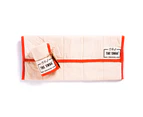The Swag Long (Eco-Friendly, Reusable, Vegetable & Fruit Storage Bag)

The long swag vegetable storage bag is mostly used to store longer vegetables such as; celery, spinach and leeks however you can put fruits & veggies that arent long or perhaps several bunches of herbs and fold it in half to make it more compact. The swag keeps your fruit, veggies and leafy greens fresher for much longer naturally! The swag not only saves you money - it saves time! Less rummaging through your fridge and less trips to the shops! Width: 52cm X Height: 38cm (opened up and including flap height) 52cm x 24cm not including the flap.
The swag is made of three different layers (International Patents Pending). Each layer plays a significant role in keeping your produce fresher for much longer! The outer layer of the swag protects your fruit & veggies and stops the water in the middle layer from drying up. However, it's the two other layers that make the difference. The thicker middle layer absorbs and holds the water, almost like the inner layer of a babies nappy, it draws the moisture away from the babies bottom, or in this case, away from the fresh produce in your swag. If too much moisture is up against your fruit & veggies - they'll rot quicker! The very Inner layer, provides a dryer barrier whilst allowing your fruit & veggies to draw on the air and water they need. This keeps everything Fresher for Longer. The Swag not only saves money, it saves time because there's less trips to the shop!
No To Plastic BagsPlastic bags are made of polyethylene, which is a petroleum product. Production of these bags contributes to air pollution and energy consumption. According to the Nolan ITU Report for Environment Australia, Australians use 3.92 billion plastic bags a year, that's over 10 million new bags being used every day. An estimated 3.76 billion bags or 20,700 tonnes of plastic are disposed of in landfill sites throughout Australia every year. Australians dump 7,150 recyclable plastic bags into landfills every minute or 429,000 bags every hour. Just 8.7 plastic checkout bags contain enough embodied petroleum energy to drive a car 1 kilometre. They clog waterways, spoil the landscape, and end up in landfills. Not using plastic bags will not only keep a cleaner environment, it will also save space in landfills. World wide approximately One trillion bags are used and discarded every year. According to the Wall Street Journal, the U.S. goes through 100 billion plastic shopping bags annually. Only 1-3% of plastic bags are recycled worldwide.
It takes 1000 years for polyethylene bags to break down. Plastic bags aren't biodegradable, they photo-degrade, breaking down into smaller and smaller toxic parts contaminating soil and waterways. Animals accidentally ingest them and these toxins are now making their way up the food chain into the food in our fridges! 86% of all known species of sea turtles have had reported problems of entanglement or ingestion of marine debris.
Approximately 1 billion seabirds and mammals die each year by ingesting plastic bags. Not only that, these poor animals suffer a painful death. The plastic wraps around their intestines or they choke to death. It's time to rid this world of plastic bags. If not for the environment, if not for the wildlife, do it for your family's health.
Food WastageFrom our farms to grocery stores to dinner tables, 30 percent of the food we grow is never eaten! We can do better...
It's time to do something about Food Wastage! When we throw out food, you also waste the water, fuel and resources it took to get the food from the paddock to our plate. This drives up the cost of fresh produce for everyone. Out of the $8 billion worth of food wasted in Australia each year, $2.67 billion is fresh produce. If you add up the food Australia wastes each year, it's enough to fill 450,000 garbage trucks. Placed end to end, the convoy would bridge the gap between Australia and New Zealand three times over. Australian's throw away 4,000,000 tonnes of food each year and a large part of this food is sitting in plastic bags which will take thousands of years to break down. When the food rots with other organic material in landfill, it gives off a greenhouse gas called Methane which is 25% more potent than the carbon pollution that comes out of your car exhaust.
Non-ToxicThe swag is made of three unique layers of 100% natural unseeded, unbleached cotton materials (international patents pending). The swag is going to be housing your food, so it's important that you can trust that it's non-toxic and non-allergenic. The Swag is both non-toxic and non-allergenic.
Cotton is both a food and fibre crop. The cotton plant produces fruit, known as bolls. The cotton seeds are about 15% of the value of the crop and are pressed to make oil. The cottonseed oil form is a common ingredient in many foods and animal feed. Cottonseed oil ranks as one of the top cooking oils in the United States. The Swag is going to be housing your food, so it's important that you can trust that it's non toxic and hypoallergenic.
Based on the research choosing unbleached, unseeded cotton was the safest and most natural path and a far better option than using toxic plastic bags and containers. Why? Plastics are made via a process called polymerization. There are always chemicals that arent 100% set into the polymeric structure and can easily 'bleed' from the original plastic source. 90 of the chemicals that are of greatest concern to our health are used to make plastic.





